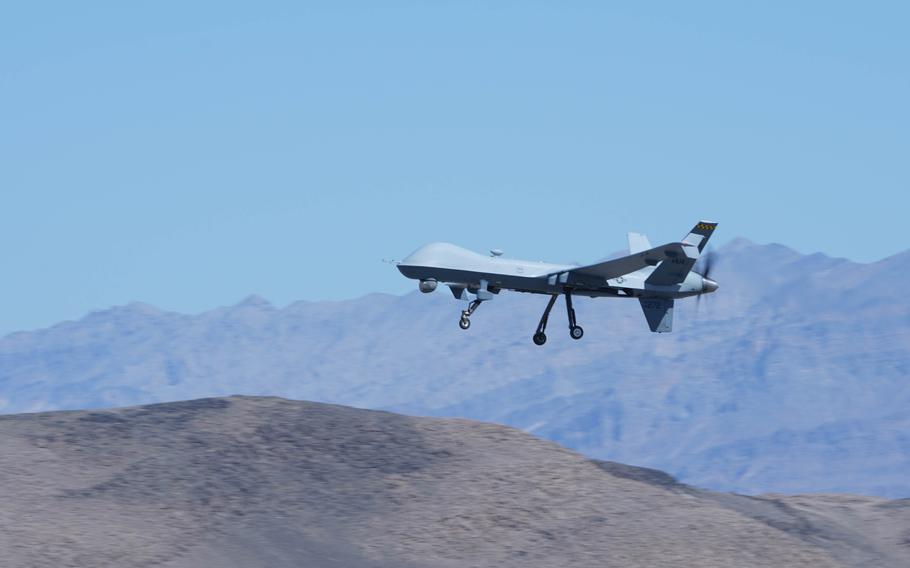
An Air Force MQ-9 Reaper, assigned to the 432nd Wing/432nd Air Expeditionary Wing, comes in for a landing at Creech Air Force Base, Nev., March 16, 2023. (Ariel O’Shea/U.S. Air Force)
WASHINGTON — The Russian military on Wednesday warned the United States not to fly more drones over the Black Sea, where an American unmanned aircraft was harassed and damaged by Russian fighter jets and forced to crash.
Russian deputy foreign minister Sergey Ryabkov cautioned the U.S. against conducting flights similar to the one that resulted in the MQ-9 Reaper crash into the sea more than a week ago. Moscow has claimed the American drone was flying through airspace now restricted because of the Russian war in Ukraine.
“The Americans demonstratively, cynically and in outright public form deny the legitimacy of [restricted Russian airspace] and state their intentions to continue actions of this kind,” Ryabkov said, according to Moscow’s state-run TASS news agency. “They are, as the saying goes, ‘asking for’ our countermeasures and we warn them against the attempts to play on nerves and test our patience. Russia’s security will be 100% ensured by all means available to us. And no American drones … can shake our determination.”
However, Pentagon officials have said the Reaper was not in Russian airspace and routine drone flights are ongoing despite the recent incident.
“We are continuing to conduct operations over the Black Sea, flying in international airspace in accordance with international law wherever it will allow us to do so,” Air Force Brig. Gen. Pat Ryder, the Pentagon’s top spokesman, told reporters Tuesday.
The Russian warning came the same day that state honors were bestowed to two fighter pilots for their actions on March 14, when they encountered the U.S. Reaper drone as it was on a reconnaissance mission.
Russian defense minister Sergey Shoigu gave Gold Star medals and Orders of Courage to the pilots during a ceremony Wednesday in Moscow, still claiming the U.S. drone made an “abrupt maneuver” that caused it to crash into the sea. Russian officials also claim the U.S. MQ-9 Reaper drone was flying in airspace declared as restricted by Moscow as part of its war in Ukraine, which it refers to as a “special military operation.”
“The Orders of Courage were bestowed on the pilots of Su-27 planes who prevented an American MQ-9 unmanned aerial vehicle from violating the airspace temporarily restricted for flights for the purposes of the special military operation," the Russian defense ministry said in a statement Wednesday.
“I don’t know of another air force in the world that would award a pilot for smashing into a drone,” John Kirby, the White House’s top National Security Council spokesman, told reporters Wednesday. “If that’s bravery, I guess they have a different definition of it. … I have no clue why they would give a bravery award to a pilot who was, at worst, maliciously putting himself and property at great risk – and, at best, is just an idiot.”
The incident happened about a week ago as the American drone was flying a reconnaissance mission through the sky above international waters. The Pentagon said the Russian pilots initially dumped fuel on the drone and harassed it for almost an hour. One of the Russian jets clipped the drone’s rear propeller and severely damaged its ability to stay in the air.
U.S. officials said the drone’s operators were forced to bring it down into the sea and take measures to prevent another country from gleaning any information from the wreckage.
Top Pentagon officials — including Army Gen. Mark Milley, chairman of the Joint Chiefs of Staff – have said the downed drone broke into many pieces and most of the debris is likely deep on the Black Sea floor.
The Black Sea is a mostly landlocked body of water in southeastern Europe that’s bordered by Turkey to the south, Russia and Ukraine to the north, Romania, Bulgaria and Moldova to the west, and Georgia to the east.
The Russian military has recovered a few pieces of the drone, including parts of an engine casing, a nose, a wing and a fuel tank, according to a report this week in The New York Times. However, there’s no indication Russian crews found anything sensitive or useful from the wreckage, the report said.
“We had seen press reports that [Russia] may have picked up some surface debris. We can't corroborate those reports,” Ryder said. “To the best of our knowledge … it's our estimation that the MQ-9, when it crashed, went very deep and has not been recovered.”